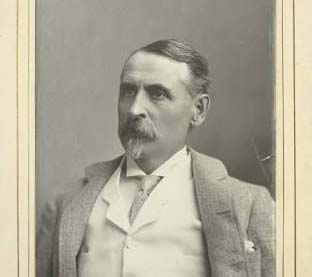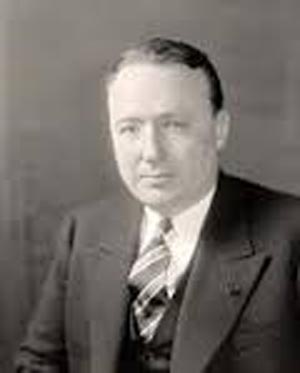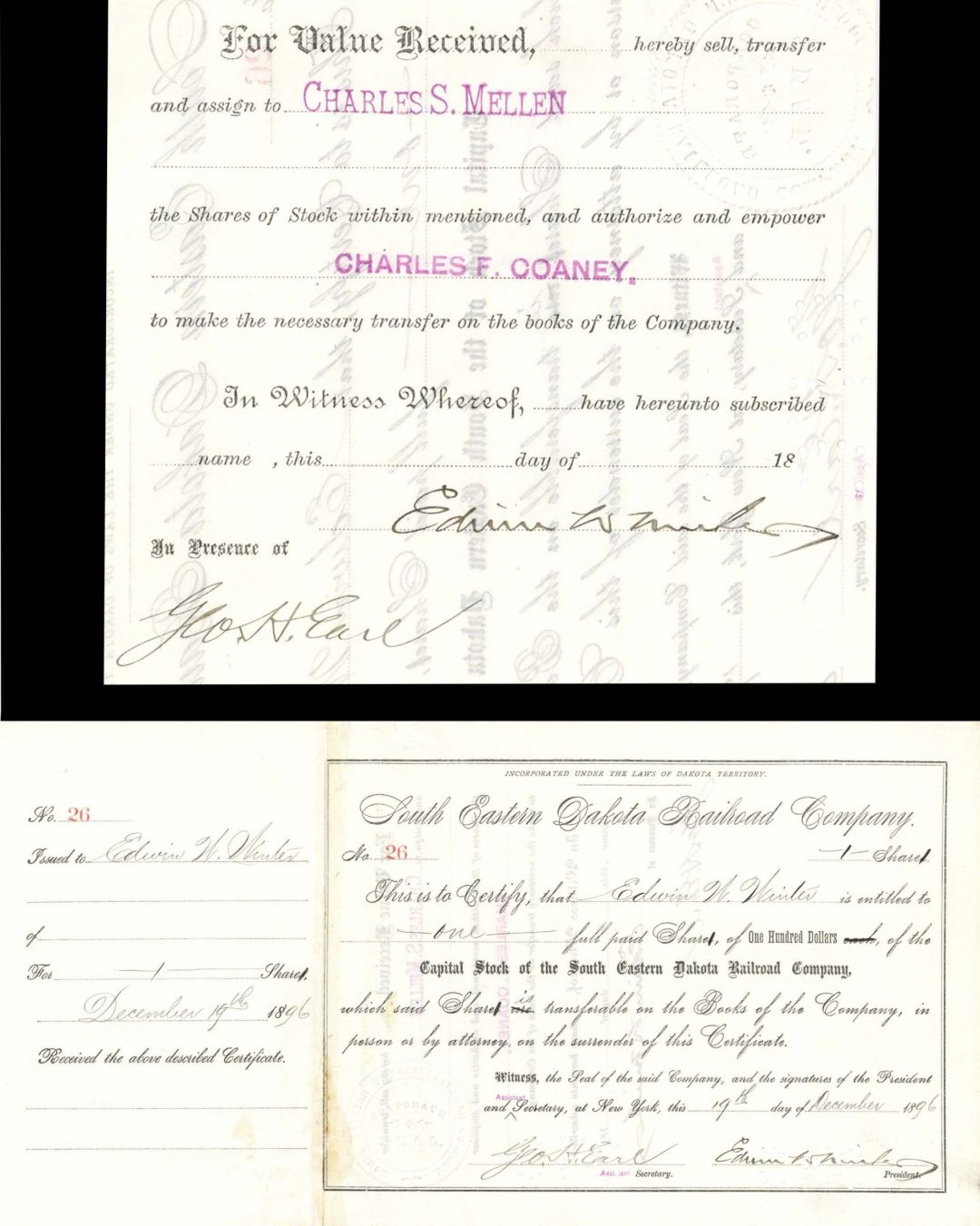South Eastern Dakota Railroad Co. Issued to and signed by Edwin Winter and Geo. H. Earl - 1896 dated Autographed Stock Certificate
Inv# AG2119 AutographStock issued to and signed by Edwin W. Winter on front as president and on back. Signed by Geo. H. Earl as secretary and on back. Certificate #26! Rare!

Edwin Wheeler Winter (born November 18, 1845 in Bloomfield, Vermont – June 28, 1930 in Little Compton, Rhode Island was president of Northern Pacific Railway in 1896 then president of Brooklyn Rapid Transit Company, Brooklyn Heights Railroad and allied companies. He entered railway service by joining Union Pacific Railway Company in 1867, where he worked till 1870 and moved to Chicago. From 1870 to 1873, Winter was a contractor’s agent on construction projects at various railroads. From 1873 to 1876, Winter was a general claim agent with Chicago and North Western Railway. From 1876 to 1879, Winter was general superintendent in western Wisconsin for West Wisconsin Railway Company. From 1879 to 1880, Winter was general superintendent for the Chicago, St. Paul and Minneapolis Railroad. From 1880 to 1881, Winter was general superintendent for the St. Paul, Minneapolis and Omaha Railroad. From 1881 to November 16, 1885, Winter was assistant president for Chicago, St. Paul, Minneapolis and Omaha Railway. June 6, 1888, he became director of the railway, and on November 16, 1885, to July 1896, Winter was general manager. From July 1896, to August 31, 1897, Winter was president for the Northern Pacific Railway. On September 1899, Winter was president for the Chicago Transfer and Clearing Company at Chicago, Illinois; In February 1902, Winter became president of the Brooklyn Rapid Transit Company, Brooklyn Heights Railroad and allied companies. In 1913 he was appointed receiver for the Chicago and Eastern Illinois Railroad, which at the time was controlled by the St. Louis–San Francisco Railway.
On February 16, 1870, Winter married Elisabeth "Libby" Cannon in Illinois and had five children in the subsequent years. He died June 28, 1930 at his summer home in Little Compton, Rhode Island.

George Howard Earle Sr. (1823-1907) Mr. Earle was of old New England Quaker stock, and he was the seventh in descent from Captain Ralph Earle, of Portsmouth, R. I. His parents were Thomas Earle and Mary Hussey, and they came to this city from Massachusetts immediately after their marriage. The son was born here on December 8, 1823.
George H. Earle received most of his education in the schools of this city. He attended a private school in Massachusetts for one year. In accordance with the practice obtaining among the Friends at that time, he was apprenticed to Matthias Baldwin, founder of the locomotive works, and served for a time in his shop.
When he reached the legal age, he decided to study law. After his admission to the Bar he spent the year 1848 in a pedestrian tour through Europe. It was an eventful journey. Owing to the political disturbances which were agitating Europe at that time, he was frequently suspected of being a spy. In Vienna, Rome, Naples, Munich and Paris he saw conflicts in the streets between citizens and soldiers. In Paris he narrowly escaped being killed.
After the year of travel he returned to this city and opened a law office in partnership with Richard P. White, his brother-in-law. Thomas Earle died the same year, and the son fell heir to his father's large practice. About that time he married Ellen Frances von Lohr, the wedding taking place on April 5, 1849.
For nearly fifty years the law firm of Earle & White enjoyed a lucrative and an extensive practice. George H. Earle soon began to assert himself as a champion of the slave and also as a municipal reformer. As a boy he had taken part in an anti-slavery demonstration, and he was wounded at the riot attending the burning of Pennsylvania Hall.
He defended many slaves captured under the provisions of the Fugitive Slave law, and on more than one occasion obtained the release of his clients. He was a delegate to the first Republican National Convention, in 1856, which nominated John C. Fremont for the Presidency. Until his death he was the oldest living delegate to that convention. He took the stump and took part in the campaigns which preceded the election of Lincoln and Grant.
After the Civil War he turned his attention to municipal affairs. As a result of the political abuses of that day the debt of the city was almost $70,000,000. He led in the movement to have the city's affairs conducted on a business basis, and he was one of the organizers of the taxpayers' association for municipal reform, of which Henry C. Lea was chairman. This association was succeeded by the Committee of One Hundred. Mr. Earle took an equally active part in the work of the committee, and as chairman of the Committee on Public Meetings he arranged all the notable gatherings. At these meetings Mr. Earle was himself a speaker. His manner was simple yet powerful, and when he desired to be, he was deliciously satirical. He kept up the fight for municipal regeneration until the adoption of the Bullitt Bill, and since that time he had kept in close touch with public affairs, although not being an active participant.
The noted Abolitionist was an intimate friend of Abraham Lincoln. In fact, there were few great men in the country's history for the past fifty years with whom he did not have close acquaintance."











Ebay ID: labarre_galleries